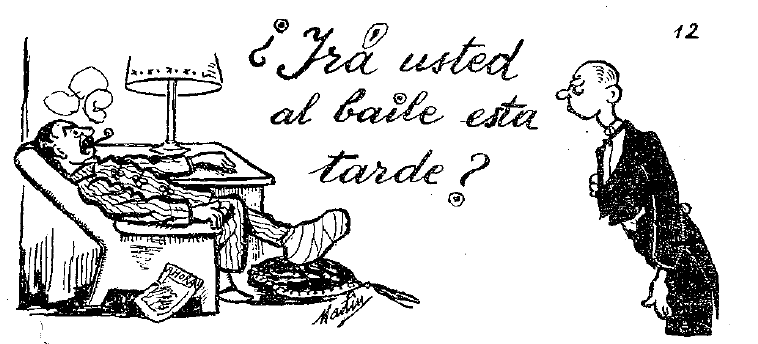
| Языки :: Испанский |
| Аудио |

 |
|
 |
|
|
Español |
Spanish |
| 35 | Lección Doce (12) | |
| Primeras impresiones |
First impressions. |
|
| 1 |
La señora vieja ha contestado : - No señor, no nos molesta (1). |
The old lady has answered : - No, sir, (it) does not disturb us. |
| 2 | El inglés fuma su pipa, y mira por la ventanilla. | The Englishman smokes his pipe, and looks out of [by] the window. |
| 3 |
El paisaje, de montanas áridas y de torrentes, me interesa también, |
The landscape, of arid mountains, and torrents, interests me also. |
| 4 | Hay pocos pueblos; es un país
pintoresco, y probablemente pobre (2). |
There are few inhabited areas; (it) is a picturesque country, and probably poor. |
| 5 | Después de una hora se detiene el tren en una estación. | After [of] one hour, the train stop [detains itself] in a station. |
| 6 |
Hay mucha gente (3), casi todos hombres. En efecto, parecen pobres, pero sin ninguna tristeza. |
There are many people, nearly all men. In fact they look poor, but without any sadness. |
| 7 |
Cuatro muchachos bailan alegremente, al son de una pandereta,
y otros palmotean con ardor (4). |
Four lads dance joyously at the sound of a tabor and others clap hands with eagerness. |
| EJERCICIOS | EXERCISE : | |
| 1 | He recibido una carta en inglés. | (I) have received a letter in English. |
| 2 | ¿Habla usted inglés? | Do you speak English? |
| 3 | Lo comprendo un poco, pero no lo hablo. | (I) understand it a little, but I do not speak it. |
| 4 | ¿Irá usted al baile (ba-eely) esta tarde? | Will you go to the dance this afternoon? |
| 5 | No; no sé bailar (ba-eelar) : yo contestaré a esta carta. | No; I do not know (how) to dance; I shall answer [at] this letter. |
| NOTES. | |
| 1 | To answer is contestar or, less frequently responder. |
| 2 |
Just like mucho, the word poco, little,
few, varies in the feminine and plural. |
| 3 |
La gente - the people, singular; or las gentes,
plural. The g, before e or i, has the same guttural sound as the j (noted H). |
| 4 | Palmotear (from palma, the palm) : to clap hands in time. |
| Remember that Spanish a is always a, even in words like palma, carta or ardor. | |
|
The sentences in our lessons are getting longer; can you repeat each of them without looking, juss after reading it? Don't forget that it is by that exercise that you wil gradually succeed in thinking in Spanish. |
